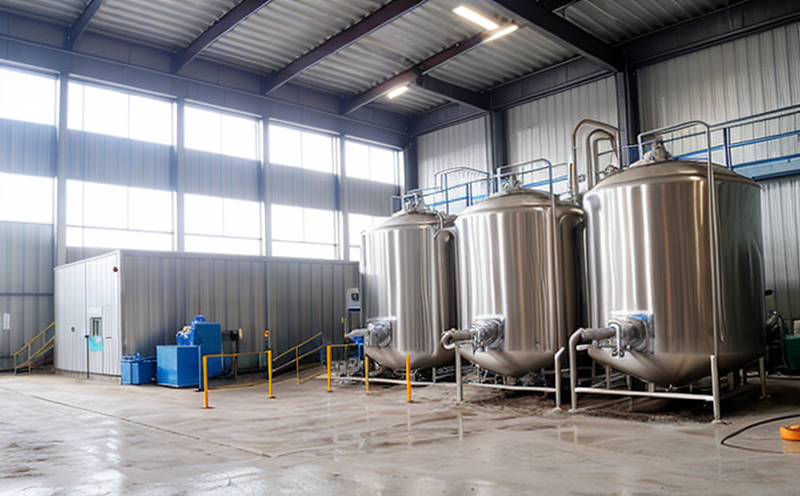ISO 7027 Turbidity Test in Process Water
The ISO 7027 turbidity test is a critical procedure used to measure the clarity of liquid samples, particularly in process water applications. Turbidity refers to the cloudiness or haziness caused by suspended particles in the water matrix. These particles include colloidal silica, clay, algae, and organic matter.
In industrial processes, maintaining optimal water quality is essential for ensuring product consistency and preventing equipment degradation. The ISO 7027 standard provides a robust method to quantify turbidity, which helps quality managers and compliance officers monitor process parameters closely. This test is particularly important in sectors such as food & beverage, pharmaceuticals, chemical manufacturing, and municipal water treatment.
The procedure involves illuminating the sample with monochromatic light at 680 nm wavelength and measuring the scattered light intensity using a nephelometer. The turbidity value is expressed in nephelometric turbidity units (NTU).
Sample preparation for this test includes filtering the water to remove larger particles that could interfere with accurate readings. Once filtered, the sample should be analyzed immediately or within specified time limits to avoid changes due to settling.
The acceptance criteria for ISO 7027 turbidity tests are typically defined by the specific industrial process requirements. For instance, a food processing plant might specify an acceptable level of NTU based on shelf life and product integrity considerations. Similarly, in pharmaceutical manufacturing, stringent limits may be set to comply with regulatory bodies like the FDA.
The test is not only important for maintaining water quality but also plays a role in process optimization by providing real-time data that can inform corrective actions if turbidity levels exceed specified thresholds.
Quality managers rely on this test to ensure consistent product quality and compliance with industry standards. R&D engineers use the results of these tests to develop new purification techniques or improve existing processes. Procurement departments may also reference ISO 7027 results when selecting suppliers of process water.
In summary, the ISO 7027 turbidity test is a vital tool for monitoring and controlling the quality of industrial process water. By providing accurate measurements of suspended particles, it enables industries to maintain high standards of product safety and efficiency.
Industry Applications
In the food & beverage industry, the ISO 7027 turbidity test is used to ensure that water used in manufacturing meets strict hygiene standards. This helps prevent contamination and maintains product integrity throughout the supply chain.
In pharmaceutical manufacturing, this test ensures that the process water used for drug formulations adheres to stringent quality control measures. It supports compliance with regulatory bodies like the FDA and WHO.
Chemical manufacturers utilize the ISO 7027 turbidity test to monitor the purity of reagents and solvents in their processes, ensuring that impurities do not affect product performance or safety.
Municipal water treatment plants apply this test to track the effectiveness of filtration systems and ensure that drinking water meets international quality standards set by organizations like WHO and EPA.
Across these industries, the ISO 7027 turbidity test plays a pivotal role in maintaining product quality, ensuring regulatory compliance, and optimizing industrial processes.
Why Choose This Test
The ISO 7027 turbidity test offers precise measurements of suspended particles in process water, which is crucial for maintaining consistent quality across various industries.
This method provides real-time data that can be used to make informed decisions about process adjustments and corrective actions.
The standardization provided by ISO 7027 ensures consistency and reliability in test results, which is essential for international trade and collaboration.
It supports compliance with both industry-specific standards and global regulations, ensuring that all stakeholders are working towards the same benchmarks.
The ISO 7027 turbidity test is an indispensable tool for industries that rely on high-quality process water. Its precision, reliability, and regulatory alignment make it a preferred choice among quality managers and compliance officers.
Competitive Advantage and Market Impact
The ability to consistently measure turbidity levels provides a competitive edge by ensuring that products meet or exceed the highest standards of quality. This can lead to increased customer satisfaction and loyalty, driving market growth.
By adhering to international standards like ISO 7027, companies demonstrate their commitment to excellence, which is increasingly valued by consumers in today's market.
The use of this test can help identify inefficiencies in the production process early on, allowing for timely interventions that reduce costs and improve efficiency. This operational advantage can translate into higher profits.
In an era where environmental sustainability is a key concern, the ISO 7027 turbidity test supports efforts to minimize waste and optimize resource use. This aligns with broader industry trends towards sustainable practices.
The ISO 7027 turbidity test contributes significantly to the competitive landscape by offering robust data that can inform strategic decisions, enhance operational efficiency, and foster market leadership.





